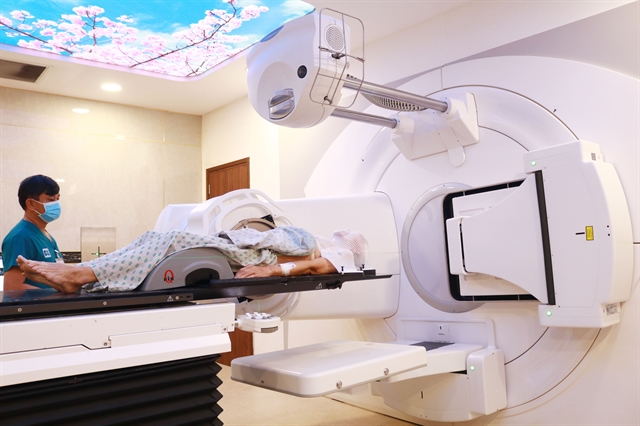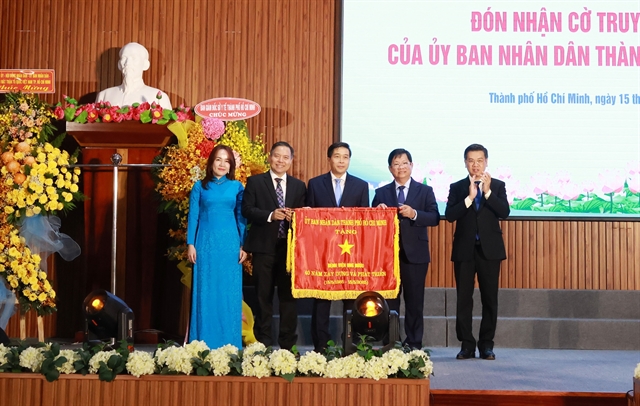 Society
Society

 |
| HCM City Oncology Hospital uses modern medical equipment for cancer diagnosis and treatment. — VNA/VNS Photo Đinh Hằng |
HCM CITY — The HCM City Oncology Hospital plans to establish a hi-tech health check and screening centre, a proton radiotherapy centre, and a cyclotron radioisotope production facility, with the vision of becoming a top-tier cancer diagnosis and treatment hub in Việt Nam and Southeast Asia.
This information was announced at the hospital’s 40th anniversary celebration held on May 15.
Speaking at the anniversary celebration, Diệp Bảo Tuấn, director of the hospital, said the hospital was established 40 years ago with just 425 beds and 465 medical staff.
It now has 1,300 beds and over 1,900 staff, equipped with comprehensive multimodal treatment technologies, including 13 external radiotherapy machines, internal radiation systems, and 20 modern operating rooms with positive pressure environments to ensure sterility.
It is fully equipped for comprehensive cancer treatments such as chemotherapy, targeted therapy, and immunotherapy.
It also boasts advanced diagnostic technologies like PET-CT, 3-Tesla MRI, CT scanners, automated lab systems, next-generation gene sequencing, and molecular biology testing.
It receives over 880,000 outpatient visits annually, along with nearly 55,000 inpatient cases, more than 375,000 outpatient treatments, around 39,000 surgeries, 180,000 radiation therapy sessions, and 320,000 medical treatments, including chemotherapy, targeted therapy, and immunotherapy.
As the leading oncology specialty hospital in the southern region, more than 70 per cent of its patients come from other provinces and cities.
The hospital plans to further develop specialised techniques in radiotherapy, robotic-assisted laparoscopic surgery, reconstructive microsurgery, and to adopt new chemotherapy, targeted, and immunotherapy protocols.
It also aims to apply AI in X-ray diagnostics, radiotherapy planning, and pathological imaging.
From 2026 to 2030, major investments will be made in key projects, such as a hi-tech health check and screening centre, a proton radiotherapy centre, and a cyclotron radioisotope production facility.
These projects are expected to serve as a foundation for transforming the hospital into a premier cancer diagnosis and treatment centre in the country and the Southeast Asian region.
Nguyễn Văn Dũng, vice chairman of the municipal People’s Committee, said cancer remains one of the major health burdens in the city and across the country, with a rising number of new cases each year.
“This situation requires effective strategies for cancer prevention and control, particularly in early detection and regular screening,” he said.
The city leaders have outlined plans to establish several screening centres for cancer and other non-communicable diseases, including one located at the HCM City Oncology Hospital campus.
“The goal is to reduce new case numbers and improve patient quality of life,” Dũng said.
 |
| HCM City leaders congratulate the HCM City Oncology Hospital on its 40th anniversary celebration on May 15. — VNA/VNS Photo Đinh Hằng |
As the city implements its initiative titled “Developing the healthcare system to become a regional ASEAN health hub from now to 2030 and beyond,” the city’s leadership has tasked the hospital’s staff with continuing to enhance specialised medical centres and adopting cutting-edge technologies like advanced radiotherapy, robotic surgery, targeted therapy, and immunotherapy to meet international standards.
“A hospital is not only a place for treatment but must strive to become a centre of academic excellence and a leading hub for knowledge transfer in the field of oncology, contributing to affirming the city’s position on the regional medical map,” he said.
He asked the hospital to improve its overall service quality by internationalising processes from patient reception and treatment to comprehensive care, making it a trusted destination for both domestic and regional patients. — VNS

.jpg)


